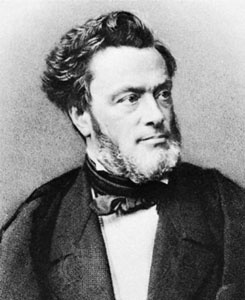Favre, Jules
French politician
born March 21, 1809, Lyon
died Jan. 19, 1880, Versailles, Fr.
 a resolute French opponent of Napoleon III and a negotiator of the Treaty of Frankfurt ending the Franco-German War.
a resolute French opponent of Napoleon III and a negotiator of the Treaty of Frankfurt ending the Franco-German War.From the time of the Revolution of 1830, he declared himself a republican. Elected to the legislative assembly of 1849 by the Rhône département, he tried with Victor Hugo and others to organize an armed resistance in the streets of Paris to the coup d'état of Dec. 2, 1851, after which he temporarily withdrew from politics.
In 1858 he distinguished himself by his defense of Felice Orsini, the would-be assassin of Napoleon III. Elected deputy for Paris in 1857, Favre was one of “the five” who gave the signal for the republican opposition to the empire. In 1863 he became the head of his party and began denouncing the Mexican expedition and the occupation of Rome. These speeches, eloquent and inclusive, won him a seat in the French Academy in 1867.
On Sept. 4, 1870, in the Government of National Defense, Favre became vice president under General L.-J. Trochu and also minister of foreign affairs, with the onerous task of negotiating peace with victorious Germany. His statement on September 6 that he “would not yield to Germany an inch of territory nor a single stone of the fortresses” was a piece of oratory that Otto von Bismarck countered, at the Ferrières meeting on September 19, by his declaration that the cession of Alsace-Lorraine was the indispensable condition of peace. Favre also arranged for the armistice of Jan. 28, 1871, without knowing the situation of the armies and without consulting the government at Bordeaux.
Elected deputy to the National Assembly in six different constituencies in February 1871, when his part in the armistice negotiation was not yet known, Favre was sent by Thiers to conclude the final peace with the Germans. He withdrew from the ministry, discredited, in August of that year and thereafter lived in semiretirement.
- John Greenleaf Whittier
- John Gregory Dunne
- John Gresham Machen
- John Grierson
- John G(riffin) Carlisle
- John Griggs Thompson
- John G. Roberts, Jr.
- John Guare
- John Gully
- John Gunther
- John Hadley
- John Hall
- John Hammond
- John Hampden
- John Hancock
- John Hanning Speke
- John Hanson
- John Harding, Baron Harding of Petherton
- John Harrison
- John Harvard
- John Harvey Kellogg
- John Havlicek
- John Hawkes
- John Hawkesworth
- John Hay